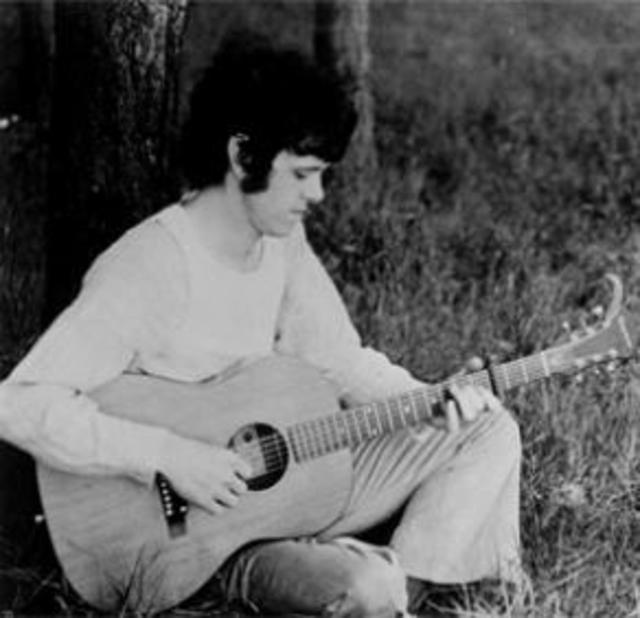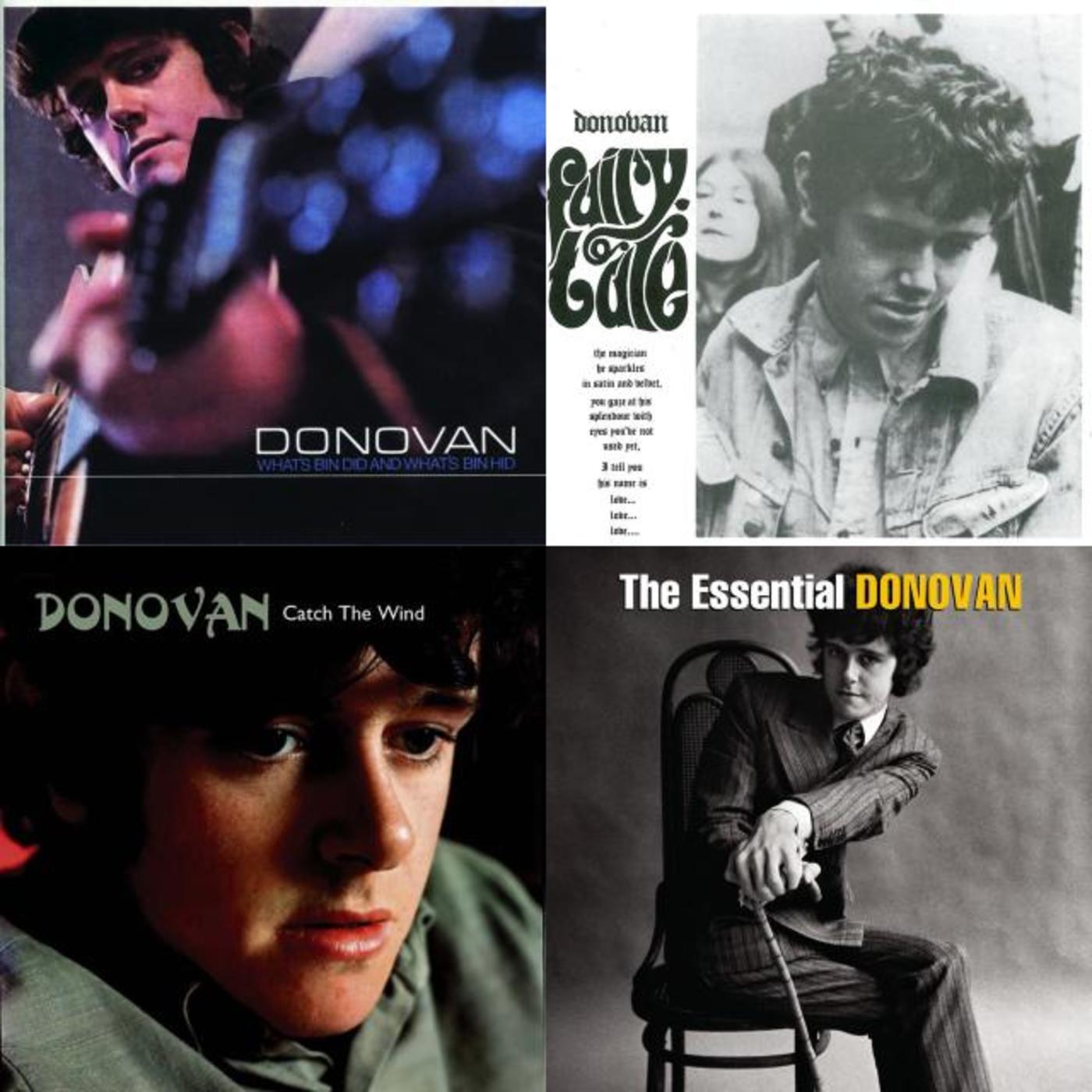Donovan

Donovan (vocals, guitar; born May 10, 1946)Donovan was a key figure on the Sixties music scene during its creative explosion. A sensitive Celtic folk-poet, singer and guitarist with an adventurous musical mind, he wrote and recorded some of the decade's most memorable songs, including "Catch the Wind," "Sunshine Superman," "Mellow Yellow" and "Hurdy Gurdy Man." He charted a dozen Top 40 hits in the U.S. and a nearly equal number in the U.K. His songs have been covered by hundreds of artists, notably Jefferson Airplane ("Fat Angel"), Al Kooper and Stephen Stills ("Season of the Witch") and the Allman Brothers Band (whose "Mountain Jam" was based on Donovan's "There Is a Mountain").Born Donovan Leitch in Glasgow, Scotland, in 1946, he moved with his family to Hatfield, Hertfordshire, England at age 10. He studiously applied himself to learning guitar in his teens, mastering a sizable repertoire of folk and blues songs. He left home to busk and travel, hanging out in bohemian circles in St. Albans and Cornwall. An appearance during a show by some friends who had an R&B band resulted in an offer to cut demos in London. This led to a publishing and management contract, as well as a string of appearances on London's pop-music TV show Ready, Steady, Go! Donovan was only 18 when Pye Records released his first single, "Catch the Wind," in March 1965. It hit Number Four on the U.K. charts (as did its followup, "Colours"). Before the year was half over, Donovan would appear at the Newport Folk Festival (at Pete Seeger's behest) and a massive concert at Wembley's Empire Pool with the Beatles, the Rolling Stones and others.Donovan's folksinger phase was documented on the albums What's Bin Did and What's Bin Hid (retitled Catch the Wind in the U.S., where it was issued on the Hickory label) and Fairytale. Initially, the media compared Donovan to Bob Dylan, largely because they were folksingers with youthful followings. Donovan and Dylan had shared influences – Woody Guthrie and Ramblin' Jack Elliott key among them – but Donovan drew more deeply from figures on his native U.K. folk scene, notably Bert Jansch, Davey Graham, Martin Carthy, Alex Campbell, an American expatriate named Derroll Adams and a colorful drifter known as "Dirty Phil." Donovan studied their styles, he said, so he could devise his own.Dylan and Donovan traded songs and compliments during Dylan's first U.K. tour in 1965, an encounter that was partially documented in D.A. Pennebaker's documentary Don't Look Back. The headline in Melody Maker, a British music weekly, read: "Dylan Digs Donovan." Dylan said: "He's a nice guy. I dig him." This was Donovan's assessment of their trumped-up rivalry: "Pop-music lyrics contained no message before the folk invasion of the charts. All the invaders felt a camaraderie, no matter what the press said to the contrary." Among popular musicians, Donovan and Dylan were ahead of the curve in opposing the war in Vietnam (and war in general). One of Donovan's earliest releases was a four-track EP of antiwar songs, including a definitive take on Buffy Saint-Marie's "Universal Soldier."Donovan next made an artistic breakthrough with a unique sound and style that fused folk, blues, jazz, classical, Latin and Indian elements. The first stirrings could be heard in "Sunny Goodge Street," from 1965's Fairytale, which had flutes, strings and jazz drumming. Lyrically, Donovan evoked the bohemian milieus in which he circulated with a brisk, beat-poet delivery. It was a liberating performance that paved the way for a creative outpouring that would make him an international star."That song had within it the embryo of everything I would do thereafter: project mystical lyrics, touch on mythological figures and experiment," Donovan said. "I wasn't trying to sound like anybody else. Basically, I was just experimenting all over the place."In essence, Donovan concocted a fusion of styles before the phrase "world music" was coined to describe such potpourris. His music wasn't strictly rock or pop, but it worked in those realms at a time when psychedelia overtook all with its exotic, borderless approach.Donovan's fruitful union with producer Mickie Most and arranger John Cameron yielded stylistically far-ranging work during the Sixties. On "Sunshine Superman" and numerous other songs from that period, such instruments as sitar, harpsichord, flute, horns, strings, tablas and other hand drums and electric and acoustic guitars might turn up. The session musicians used on Donovan's records included Jimmy Page and John Paul Jones. "Hurdy Gurdy Man" – his heavy hit from 1968, on which both played – offered a foretaste of Led Zeppelin's marriage of acoustic folk and electric rock. It reached Number Five in the U.S. and Number Four in the U.K., where it was his seventh Top 10 hit in a little more than three years. Donovan devised a jazz-blues hybrid on "Season of the Witch" and "There Is a Mountain," with both songs becoming favorites among rock musicians who discovered that its chord changes lent themselves well to jamming.Donovan's big year was 1966, owing to "Sunshine Superman" and "Mellow Yellow," which hit Number One and Number Two, respectively, in America. In the U.K., he found himself tied up in contractual red tape for much of that year, delaying those records' release in his homeland. (Because of the delay, the albums Sunshine Superman and Mellow Yellow were combined into one for the U.K. market.) A rising star in the U.S., he was among the vanguard British acts – along with the Beatles and Cream – who made waves at a time when popular music was embarking on oddly alluring new tangents.The words Donovan delivered in a Scottish burr were whimsically surreal. They were not typical pop lyrics but modern poetry, with Lewis Carroll and W.B. Yeats as inspirational touchstones. There were character studies, such as "Jennifer Juniper," about one-time girlfriend Jenny Boyd (sister of Patti Boyd, George Harrison's wife) and "Legend of a Girl Child Linda" (an ode to Linda Lawrence, his muse and eventual wife); pastoral visions ("The River Song," "Three King Fishers"); illusions and riddles (the Zen-like "There Is a Mountain"); and paeans to universal love ("Wear Your Love Like Heaven").Donovan could be witty and urbane, too. "Mellow Yellow" slyly sketched the social whirl of Swinging London, with whiffs of sensuality and pot smoke amid the procession of New Orleans–style horns. He wrote knowingly of the world he inhabited in "Sunny South Kensington" and "Hampstead Incident." "Poets have a sense of place," he said. "My place was London, and I sang about it."Donovan's songs were further inspired by his wanderings. Before he was ever signed and recorded, he hoboed and busked his way around the U.K. As his popularity grew, he saw the world as a touring musician and ever-curious traveler. Various locales inspired certain songs. A visit to Mexico's Baja coast yielded "Sand and Foam." Remote islands in Greece and Scotland were the settings for "Writer in the Sun" and "Isle of Islay," respectively. The turned-on bustle of Los Angeles' Sunset Strip resulted in the "The Trip," the tale of a psychedelic sojourner who asks, "What goes on? I really wanna know." Donovan even conjured the mythical lost continent of Atlantis in a song of that name.The open road beckons in many of Donovan's songs, and he tellingly named his 1970 trio (and their lone album) Open Road. Incidentally, Open Road – Donovan's first album of the Seventies – was one of his strongest, delivered in a lively acoustic style he called "Celtic rock."Though he was a fanciful apostle of youth culture, Donovan endeavored to bridge the generation gap with a conceptual double album in 1968. A Gift from a Flower to a Garden included an album of songs for parents and another for children. It came in a box – a lavish touch generally reserved for classical releases – and featured a folder with a sheaf of poems. On the cover, Donovan holds a flower while standing in a field; on the back, he sits cross-legged with the Maharishi Mahesh Yogi, whom he'd met on a trip to India with the Beatles in 1968.By this point, Donovan had begun moving beyond hallucinogens and embracing meditation as a more natural source of enlightenment and relaxation. He included this message among his musings inside A Gift from a Flower to a Garden: "I call upon every youth to stop the use of all drugs and heed the quest to seek the Sun."Donovan continued to pursue his pacifistic, bohemian outlook in the Seventies with such releases as Open Road, Cosmic Wheels and 7-Tease. Themes of love, compassion and understanding have run throughout Donovan's work, from his earliest recordings to albums of more contemporary vintage, such as 1996's Sutras (produced by Rick Rubin) and 2004's Beat Cafe. Donovan's autobiography was published in 2007.The very first Rolling Stone interview, published in the magazine's premiere issue in 1967, was with Donovan. In it, he made a statement that neatly summarized his approach to music: "There's only one thing in the end, and that's singing truth in a pleasant way."Thirty years later, upon the release of Sutras, his outlook and methodology remained very much intact. "I never considered myself an entertainer," Donovan maintained. "I always felt I had to be connected to something meaningful, or it wasn't worth doing."

